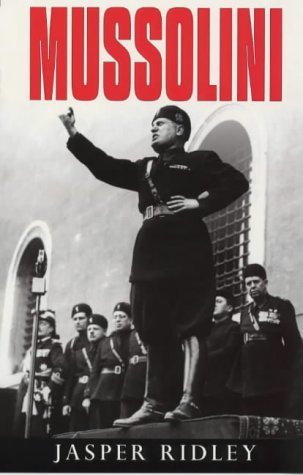

 |

|

The average rating for Dead again based on 2 reviews is 3 stars.
Review # 1 was written on 2014-07-30 00:00:00 Kelly Ligue Kelly LigueMussolini: A Biography l have read other bios of Mussolini but this one by Ridley is at the top of my list. The narrative was most interesting and I learned many new and personal facts about Il Duce. I recommend this book to all history buffs. |
Review # 2 was written on 2020-02-09 00:00:00 Matt Mizell Matt MizellThis is the third book about Mussolini I have read from a British historian and it is definitely the worst. The style is odd, as Ridley appears to be going for chronological, but it comes across as fragmented and often he will double back to return to an event that happened earlier (for example, he explains how Italy won the Italo-Abyssinian War but then goes back to discuss the Hoare-Laval Plan). There is some genuinely good information to be learned from this book, hence the two stars. However, unlike Richard Lamb's "Mussolini as Diplomat" and Christopher Hibbert's "Rise and Fall of Il Duce", Ridley throws in very clumsy modern criticisms of Mussolini that come across as politically motivated (which should come as no surprise, given that Ridley ran with the Labour Party). Ridley makes some statements that one will find frustrating if they go into this knowing anything about Fascist Italy. For example, he states at the end that Mussolini didn't want to surrender to America because Roosevelt was a cripple and America had blacks fighting for them, which Ridley claims Mussolini was embarrassed that his "strong, Italian Fascists" were being beaten by "Negroes". This is what I would call a Telling Statement, stemming from Ridley's desire to virtue signal. Italy had Eritreans numbering in the tens of thousands fighting for them (including Eritrea's founding father), Somalians in the thousands, Libyans in the tens of thousands, and Abyssinians as well. Given that Ridley does not back up this ludicrous claim with any quotes from Mussolini, this is simply an ad hominem and unjustified attack on Mussolini. Ridley does the same with the Ethiopian War which he paints as a war between Blacks and Whites, once again omitting that the Italians had almost 100,000 Eritreans and Somalians fighting with them in that war. While he draws attention to African Americans "hanging Mussolini in effigy" during the war, he forgets to mention Black Nationalist leader Marcus Garvey's comments on Italy's opponent, Haile Selassie, whom Garvey referred to as "at best a slaveholder" and "a great coward". He prefers to draw attention to Italy's use of poison gas while, but Ridley omits the fact that the Amharic people (ruling class) of Ethiopia were conducting ethnic cleansing policies on the Harari people (which Italy stopped). He also omits the Oromo people (the second largest ethnic group in Ethiopia at the time) attacked Selassie's Amharic forces in tandem with the Italians at the Battle of Maychew. Certainly, it is convenient for Ridley to paint it as a war between Black and White, but this was not the reality of the war. Ridley also ends his book with a very clear stab at nationalism, saying that Fascism may rise again if politicians find that they can win by appealing to "nationalist and racial hatreds". This lays his motivation bare, though it is obvious where Ridley stands from the get-go. Given that Mussolini did not rise to power by appealing to hatred (other than perhaps hatred of instability and mass poverty) this is a comment that does not relate to Italian Fascism, but seems to be a broad stroke that would better apply to Nazi Germany. It also lays bare Ridley's clear lack of understanding of nationalism (rather not discuss in a review but Ridley makes it a point in his book). Overall, this book is written fairly well, though the order is confusing. There's some good information but ultimately comes across as a hit-piece rather than a genuine look on Mussolini, as Ridley omits many things that contradict his clearly liberal viewpoint. If you want a better book on the life and leadership and downfall of Mussolini, I'd wholeheartedly recommend Christopher Hibbert's Rise and Fall of Il Duce, which is written with more mastery of the subject and a mastery of the art of objectivity in historical assessment. Richard Lamb's Mussolini as Diplomat is also good, if you are looking for a book that it about Italy's role on the world stage with Mussolini at the helm. |
CAN'T FIND WHAT YOU'RE LOOKING FOR? CLICK HERE!!!